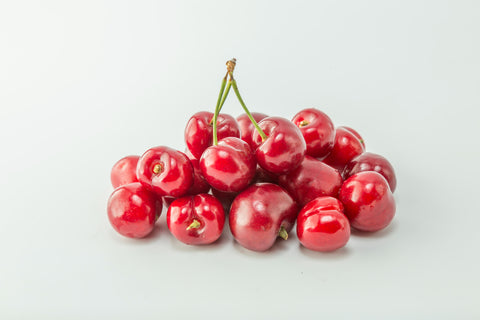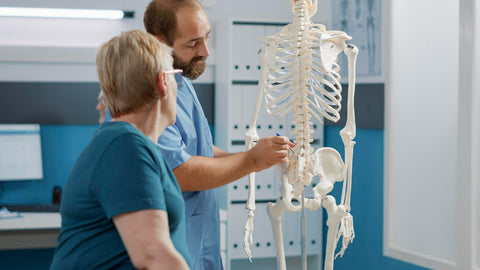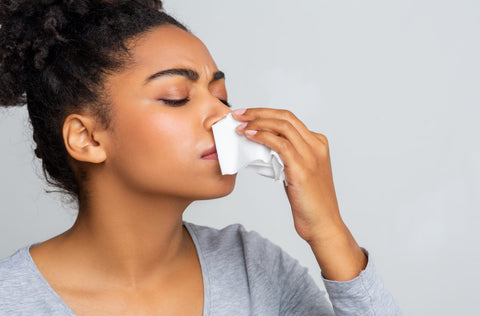Gout is caused by uric acid crystals forming in the joints – particularly the big toe, ankles, hands and wrists. It might be very painful, but can be controlled with right lifestyle and nutritional modifications.
Under normal circumstances uric acid is very beneficial as in our body it works as a powerful antioxidant and a scavenger of harmful free radicals. For this reason blood levels of uric acid shouldn’t be tool low as it may lead to hypouricemia. Healthy, normal blood levels of uric acid range between 3 and 7 mg/dL.
The problem starts when due to an unhealthy diet and lifestyle, our body is unable to metabolise it properly. The liver makes enough uric acid to address our needs, but when we overload our body with excessive amount of purines from animal foods and other sources, liver makes too much uric acid. And when poorly functioning kidneys are unable to remove this excess, uric acid starts accumulating and forming crystals.
Causes
-
Foods that are high in purines include meat and fish. Excess animal protein leads to the formation of large quantities of ammonia, which is converted in the body to uric acid. Studies showed that meat purines significantly increase the risk of gout.
-
Overconsumption of fructose found in refined sugar, high glucose/fructose corn syrup (sodas and processed foods), and fruit juices. When our live breaks down fructose, it releases purines which are then converted to uric acid. In one experiment, male participants who drank two glasses or more of fruit juice a day were twice as likely to get gout as those who drank less than a glass daily.
-
Poor kidney function caused by years of dehydration (drinking insufficient amounts of clean water), deficiency of vitamins, minerals and antioxidants, regular use of stimulants (caffeine, alcohol, smoking, etc.), toxin overload, diet high in animal protein, and refined sugar. All these factors contribute to the inability of kidneys to eliminate excess uric acid efficiently.
-
It was found that the risk for gout is nearly double in people who are obese compared to those who aren’t.
Diet and Lifestyle Recommendations
-
Avoid or significantly reduce consumption of foods high in purines (meat, fish) and animal fat as it interferes with the excretion of uric acid. The same causes alcohol and coffee.
-
Avoid soda and fruit juices (especially orange juice). It was demonstrated that drinking one soda a day caused 74 % increase in gout symptoms while a glass of orange juice increased the same risk by 40 percent. It is believed that the primary cause is fructose, which generates uric acid within minutes of ingestion. You can eat whole fresh fruits but moderate amounts.
-
Eat more fresh raw vegetable salads (especially celery and beets with added Humus) and drink one glass of fresh raw vegetable juice (made of celery, beets, carrots, and kale) with one tablespoon of Super Greens powder (chlorella, spirulina, alfalfa, beets, barley grass, etc.) 15-30 minutes before meals.
-
Increase metabolism, detoxification, blood circulation, liver and kidney function by daily energetic exercises or fast walking with deep breathing (helps remove excess carbon dioxide which exacerbates the pain caused by gout).
-
Drink 2-3 glasses of properly filtered water three times daily between meals, avoiding water stored in plastic bottles.
-
Control stress because stress often precedes attacks of gout.
Beneficial Foods and Nutritional Supplements
-
Vitamin C supplementation may be beneficial in helping reduce serum uric acid levels. Studies demonstrated supplementation with 500 mg/day of vitamin C for 2 months reduces serum uric acid.
-
Folic Acid (or Methylfolate which is a better form of this vitamin) contributes to normal homocysteine metabolism. Elevated homocysteine levels enhance inflammatory response and have been linked with a major risk of chronic diseases including arthritis and gout.
-
Montmorency Tart Cherry. The suspicion that cherries might help with arthritis and gout was first proposed in 1950 by Dr Blau. His preliminary study found that daily cherry consumption helped to ease pain caused by gout. After eating the cherries, the participants had lower blood levels of uric acid. In a study of over 600 people with gout, those who consumed a ½-cup serving of cherries every day, or took cherry extract, had a 35 percent lower risk of a gout attack. Those who ate up to three servings had 50 percent lower risk. Researchers from USDA’s Human Nutrition Research Center at the University of California, found that healthy women (ages 20 to 40 years) who consumed cherries, showed a 15 percent reduction in uric acid levels.
-
Celery. Studies reported in the Journal Phytomedicine revealed that celery seed extract help reduce uric acid build up leading to pain relief by suppressing enzymes involved in the synthesis of pro-inflammatory cells. A celery extract was tested on gout sufferers. The first group (15 people) were given 34 mg of this celery extract twice daily; a second group (70 people) received 75 mg twice daily for three weeks. Both groups reported relief from pain. Those receiving the higher dosage had better results.
-
Turmeric. A research results published in 2009 (Insights into the inhibition of xanthine oxidase by curcumin) state that turmeric has been shown to inhibit inflammation with the potential to help gout suffers because it can reduce the activity of xanthine oxidase, the enzyme involved in the production of uric acid.
-
Banaba Leaf, Celery Seed and Green Coffee Bean extracts are rich in phytochemicals such as polyphenols, quercetin and chlorogenic acid that provide antioxidant protection and have been linked with inhibition of Xanthine Oxidase, the key enzyme involved in hyperuricemia.
Sources
-
http://umm.edu/health/medical/altmed/condition/gout#ixzz3fOcVrdCt
-
https://www.ncbi.nlm.nih.gov/pubmed/12771324
-
https://www.ncbi.nlm.nih.gov/pubmed/23023818
-
https://www.ncbi.nlm.nih.gov/pubmed/15234783
-
https://www.ncbi.nlm.nih.gov/pubmed/15934094
-
https://www.ncbi.nlm.nih.gov/pubmed/19800788
-
https://www.ncbi.nlm.nih.gov/pmc/articles/PMC5099468/
-
https://www.ncbi.nlm.nih.gov/pubmed/11025157/
-
https://solberry.ca/cherry-research/
-
http://blog.arthritis.org/living-with-arthritis/arthritis-diet-cherries/
-
https://www.ncbi.nlm.nih.gov/pmc/articles/PMC2898531/
-
https://www.sciencedaily.com/releases/2006/10/061030071152.htm
-
https://www.ncbi.nlm.nih.gov/pmc/articles/PMC2767211/ Vitamin C Intake and the Risk of Gout in Men- A Prospective Study. Arch Intern Med. March 9, 2009; 169(5): 502-507.
-
Journal of Food Studies ISSN 2166-1073 2012, Vol. 1, No. 1 Efficacy of Tart Cherry Juice to Reduce Inflammation. Biomarkers among Women with Inflammatory Osteoarthritis (OA). Kuehl, K. S., Elliot, D. L., Sleigh, A, E., and Smith, J. L.
-
Journal of Food Studies ISSN 2166-1073 2012, Vol. 1, No. 1 Efficacy of Tart Cherry Juice to Reduce Inflammation. Biomarkers among Women with Inflammatory Osteoarthritis (OA). Kuehl, K. S., Elliot, D. L., Sleigh, A, E., and Smith, J. L.
-
Polish journal of food and nutrition sciences. 2008, Vol. 58, No. 3, pp. 389-395. Evaluation of anti-gout activity of some plant food extracts. Doha A. Mohamed, Sahar Y. Al-Okbi.
-
Alim. Nutr., Araraquara. v.20, n.2, p. 185-190, jun. 2009. Effects of green coffee bean extract in some biomarkers of adult brazilian subjects. Jácome, M. A., Uehara, S. K., Monteiro, W. L. A. et al.
-
Huang, H.Y., Appel, L. J., Choi, M. J., Gelber, A. C., Charleston, J., Norkus, E. P. and Miller, E. R. (2005). The effects of vitamin C supplementation on serum concentrations of uric acid: Results of a randomized controlled trial. Arthritis & Rheumatism, 52: 1843–1847.
Any information or product suggested on this website is not intended to diagnose, treat, cure or prevent any medical condition. Never disregard medical advice or delay in seeking it because of something you have read on this website. Consult your primary healthcare physician before using any supplements or making any changes to your regime.




